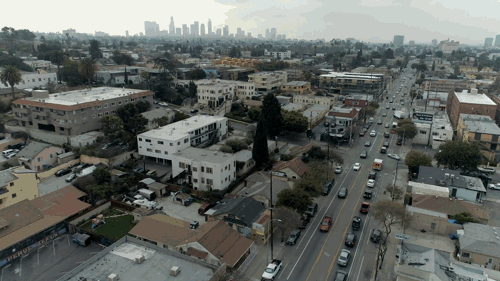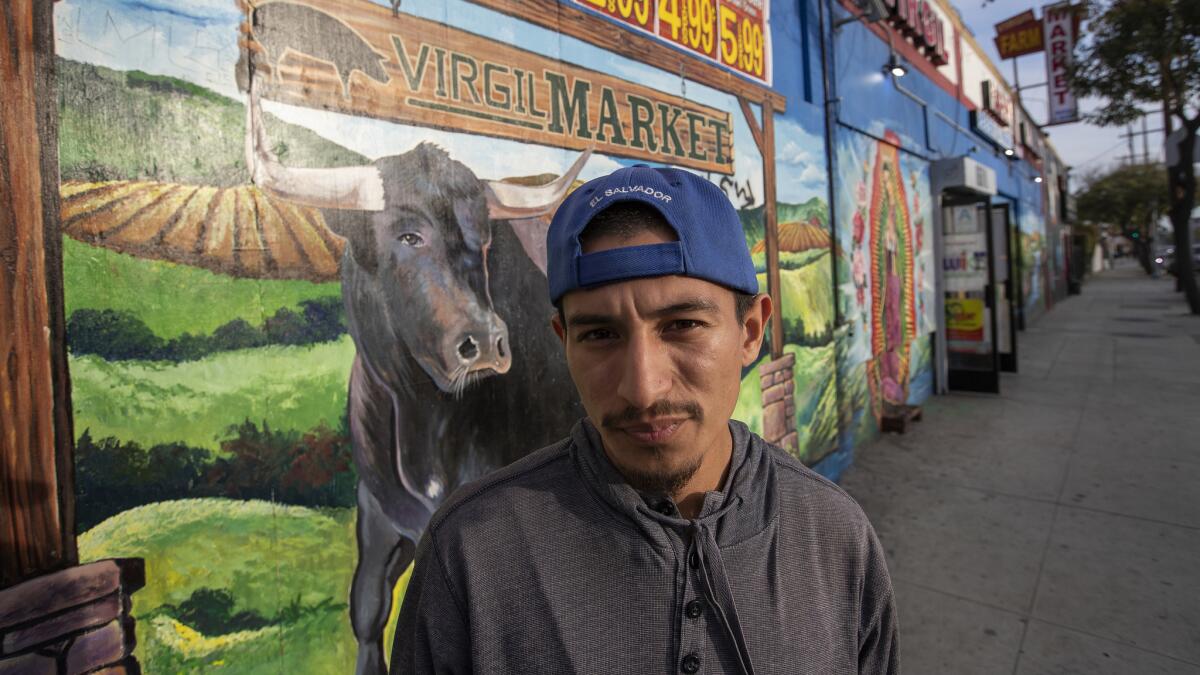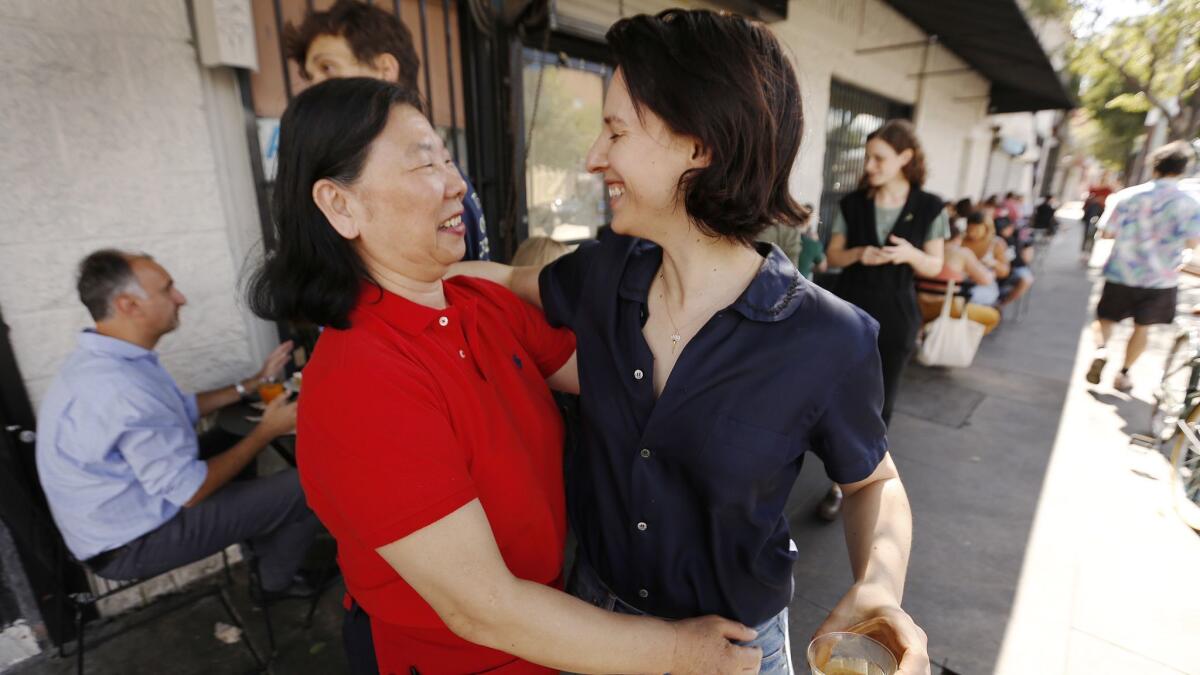Column: On Virgil Avenue, avocado toast and four different versions of the same city
- Share via

After more than a year together in our East Hollywood home, I discovered that my mother, a Taiwanese immigrant, had never had avocado toast.
There are probably millions of people in Los Angeles who have never tried avocado toast, but still, I was surprised. At the time we lived just three blocks north of Sqirl, a cafe considered the cradle of toast culture in Los Angeles. And avocado toast, I kept reading, is Los Angeles in a dish, the hallmark of all things Californian.
As I struggled to explain in Mandarin how it was prepared (and why she should stop refrigerating my avocados), my mother just shrugged and went back to chopping garlic.
It was the moment I realized that we lived in the same house, but different cities. I liked House of Pies, took visiting friends to Sqirl and shopped at Trader Joe’s. My mom shopped at Zion Market in Koreatown and ate at Pine and Crane or Yoshinoya Beef Bowl. I read the L.A. Times and LA Weekly, and she read World Journal or watched LA 18.
I guess Los Angeles has always been like this. We live our lives in parallel with few intersections, each of us experiencing a different city with its own culinary hallmarks.
But I was troubled that my mom and I didn’t seem to be living in the same city. And as a journalist, I worried about all the other versions of Los Angeles I couldn’t see. How many were just outside our front door?
East Hollywood is a neighborhood of 78,000 people, two-thirds of whom were born outside the United States.
Filipino restaurants serve up chicken adobo and pig blood stew over steam trays all around us. On weekends, backyard quinceañeras blast mariachi and bachata music across gently rolling hills, the drumbeats tapping on our windows.
The Korean church has uniform-height bushes and neatly spread gravel. At the Salvadoran Catholic church next door, a parking crew crams the clergy’s cars into a stamp-sized parking lot, a weekly display of incredible spatial reasoning and patience.
Across the street from our house, there’s a low concrete staircase where kids skateboard, lounge, or sit with dates.
Jimmy Recinos, 28, used to be one of them.

Born in East Hollywood, Recinos hails from the Los Angeles where a lot of people feel forgotten; where kids grow up loving art but fall into graffiti because there are no art programs; where you might take dates to a low concrete staircase because there’s no park nearby.
His Oaxaca-born mother, who runs a local newsstand, chose the neighborhood in the 1980s because it was affordable and seemed hospitable to immigrants.
Sometimes he rides his bike around the neighborhood and thinks about how it’s all changing. Schoolchildren now share the sidewalk with professional dog walkers. Down the street there’s a new wine bar, but it used to be Amalia’s, one of the most popular Guatemalan restaurants in the city. Next to it is a newly renovated million-dollar home hidden by thick wood slats. Fences aren’t new in this neighborhood, but at least you could wave hello through the wrought-iron bars of the old ones.
Construction noise is everywhere. Shiny residential developments tower over the streets Recinos biked down as a kid. High-priced restaurants keep opening while the older, affordable places are struggling.
His version of the city fades a little every day. He tries to shop at the places that keep his memories alive: hamburger meat for barbecues at Carniceria 21, pan at Virgil Farmers Market, haircuts at Quality Barber Shop. His transactions are less like lifelines and more like offerings left at an altar.
He used to stop for coffee at Super Pan Bakery, the last panaderia on Virgil Avenue.
Elvia Perez, 58, ran this bakery with her two sons and daughter for the last two decades.
She lives in the Los Angeles where churches locate in strip mall storefronts because there is nowhere else to go; where 25 cents for pan is all most can afford; where people do business with handshakes because they are family friends, or because they emigrated from the same region in Guatemala or Mexico or El Salvador.
Super Pan sold discounted pastries to the many churches that line Virgil Avenue and supplied bread to area street vendors. On Thanksgiving, locals without ovens brought turkeys over for Perez to bake for a small fee.
For decades, Perez’s landlords were mostly religious nonprofits and churches, and she never had a contract or faced eviction. But Super Pan’s new landlords were investors and real estate firms.
One offered a contract if Perez renovated the space. Her sons, husband and nephews retiled, installed brick laminate on the walls and erected a new ceiling. It cost more than $2,000, and half of Perez’s husband’s index finger. He severed it slicing the brick laminate. Still, no contract.
The next owner, a real estate investment firm, didn’t offer them a contract either, and raised their rent by more than 200%.
Activists and locals like Recinos circulated petitions and contacted attorneys and politicians. Capstone agreed to give Super Pan until December to vacate the property, forestalling an immediate eviction. But in December, Perez relocated to a place in South Los Angeles.
-----------
FOR THE RECORD:
This article uses the word “activists” in linking to an Instagram account of Samanta Helou Hernandez. She is a journalist.
-----------
One block south of Super Pan’s former location, Jessica Koslow, a native of Long Beach, opened Sqirl in 2011 because it was the only place she could afford the rent.
The restaurant is located in the Los Angeles you may have heard about, the East Coaster’s fantasy, the one where celebrities act like normal people and normal people act like celebrities; where everyone has time to wait in line for brunch.
The restaurant quickly got popular after a Jonathan Gold review. Then it got huge. TV shows put Sqirl’s jam in their farmers market scenes. Magazines put Koslow’s picture on their covers. Restaurants everywhere started putting avocados on toast, garnishing breakfast bowls with watermelon radishes and selling high-end jam.
Many reveled in the apparent anonymity of the neighborhood around Sqirl — it made their meals feel more adventurous. It was as if the restaurant got so big that the rest of the world couldn’t see East Hollywood around it.
Housing prices rose. Up the street, a whole building of families was evicted. One day, spray paint on the restaurant compared Sqirl to Trump, blaming it for displacing longtime residents.
Breakfast restaurants don’t evict people, but the complaints keep Koslow up at night. She understands that venture capitalists and real estate investors have come to East Hollywood, and avocado toast had something do with that.
She wishes she could talk with her critics. She patronizes local businesses and tries to treat her neighbors with respect. Sqirl staff meals are often pupusas from Salvadoran restaurants just up the street or takeout from Wah’s Golden Hen across the street.
Wah’s owner Lena Louie lives in the Los Angeles where it’s common for old-school Cantonese restaurants to have largely Latino clienteles, where the celebrity regular is comedian George Lopez, where the crowds lining up outside her restaurant dress more casually.
Her family opened Wah’s in 1972 after fleeing the Cultural Revolution. They settled in East Hollywood because they heard it was affordable and friendly to immigrants. Louie and her husband, a Chinatown cook, took over the restaurant in 1991.
Work is Louie’s way of life. At 63, she has narrowed her path through the city to a small triangle consisting of the restaurant, her home and Costco, where she buys supplies. She hasn’t visited her homeland for three decades because she felt they couldn’t afford to close.
Louie’s stepmother, 88, walks to the restaurant every day and folds thousands of wontons. A dozen go into each wor wonton soup, along with sauteed chicken, shrimp, napa cabbage, chashu pork and snow peas — the kind of affordable, generous meal that inspires intense loyalty among customers. When the business was targeted during the L.A. riots, customers and their families stood guard out front to deter looters.
Louie has befriended nearly everyone in the neighborhood, including Koslow, whom she calls “her favorite.” But Louie had never tried the food at Sqirl.
A few weeks ago, I asked if she’d have brunch with me there.
I arrived at Wah’s at around 10 a.m. to find Louie fielding lunch orders and setting tables. It took four tries to leave the restaurant with her — the phone kept ringing her back until a customer took mercy upon us and offered to take orders.
We headed across the street, a short walk from Louie’s Los Angeles to Koslow’s.
Louie kept glancing back at her restaurant. She’s too frugal to eat out — she lived in America for a decade before she even saw the inside of a McDonald’s. Sometimes she treats herself to noodles at the Yoshinoya down the street, but she always feels guilty.
She asked me what Sqirl’s food is like. I tried to describe it, but I have no idea how to say “sorrel pesto” in Mandarin. I’m not totally clear myself on what lacto-fermented hot sauce is.
At Sqirl, Koslow and Louie greeted each other with nervous, excessive kindness. Louie assured Koslow that the food would be delicious, and Koslow laughed in a slightly terrified way.

Koslow presented Louie with a crispy rice salad, a rice porridge and a bright orange turmeric latte.
Louie sipped the latte, set it down and left it there. She regarded the salad, head cocked as if it might start talking, then ate half a spoonful.
Her eyebrows jumped. “Oh, this is crunchy! How did you do that?”
Koslow looked relieved. They launched into an animated conversation about how the rice is prepared and the struggles of running a restaurant. Louie even got up and started busing dishes at one point, before Koslow stopped her, laughing and tearing up a bit. By the end, Louie was trying to persuade Koslow to start a restaurant together.
Watching them, I thought about how things might be different if we spent more time in the same Los Angeles, the one where we try to understand our neighbors, where the parallel lives we lead intersect every once in a while.
A few months ago, I took my mom to Sqirl for the first time.
She said the avocado toast was OK, and she was impressed with the crispy rice salad. But she probably won’t be back.
Mostly, she was just glad that I had tried to show her my side of the city, even if it would never be hers.
Produced by Brian Park.
Additional credits: Video edited by J.R. Lizarraga
Sign up for Essential California
The most important California stories and recommendations in your inbox every morning.
You may occasionally receive promotional content from the Los Angeles Times.








